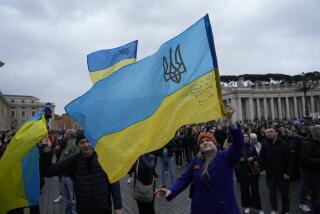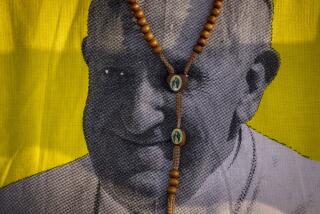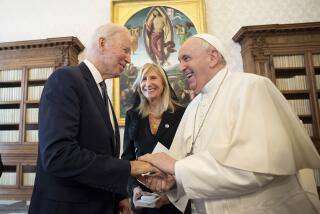U.S. Bishops Split on War’s Morality : Religion: Roman Catholic and other Christian leaders last fall raised questions about possible military action. But one cleric now says the prelates lack a “clear consensus” to declare the conflict unjustified.
- Share via
The nation’s Roman Catholic bishops are divided on whether the U.S.-led offensive to oust Iraq from Kuwait is a morally “just war,” an archbishop said Monday in the first major assessment of the fighting by a spokesman for the American prelates.
Although the bishops and other mainstream Christian leaders last fall were prominent in raising moral questions about possible military action, Archbishop John Roach of Minneapolis indicated the Catholic bishops lack “a sufficiently clear consensus” to declare the war morally unjustified.
Roach, chairman of the bishops’ international policy committee, also defended the bishops against unnamed critics for not rallying around the flag. He spoke at a Catholic conference on social justice in Washington, D. C.
Religious leaders should not be “cheerleaders for war, no matter how popular, nor are we called to oppose all use of military force,” he said.
“Some believe we are now functional pacifists,” Roach said, adding that he disagreed with that assessment.
Bishops are obligated to raise moral questions about the conduct of warfare. “Just war is always limited war,” Roach said.
For instance, he urged the allied forces to “remain focused on the liberation of Kuwait and . . . (avoid) escalating objectives that are not compatible with bringing about genuine peace and reconciliation in the region.” Roach also said that he could not conceive of any justifiable use of nuclear weapons against Iraq, even in reprisal against the use of biological or chemical weapons.
Roach did not say how many bishops have concluded that the allied coalition is meeting traditional Catholic criteria for conducting a just war.
Only a few U. S. prelates have publicly given their qualified support for the Bush Administration’s military action, notably Cardinal Bernard Law of Boston, Archbishop William Levada of Portland, Ore., and Archbishop Theodore McCarrick of Newark, N. J. Not surprisingly, Archbishop Joseph T. Ryan, the military vicar for U. S. Catholics, defended the war at length on Feb. 17, saying: “We make peace happen when we remove the threat to peace.”
Noting that the bishops have sought to develop a unified stance, Roach conceded that most bishops, lacking enough data on civilian casualties and other aspects of the war, “have withheld a definitive judgment.” He said Catholics will have to search their consciences and make their own moral judgments on the war.
After the allied coalition starting bombing Baghdad on Jan. 17, most U. S. bishops expressed dismay even as they condemned Saddam Hussein and prayed for the safety of American troops. Los Angeles Archbishop Roger M. Mahony, Roach’s predecessor as the U. S. bishops’ international policy chairman, warned that “there are never clear winners in war” and cited fears that long-term damage will be done to the ecology and religious relations in the region.
Any American bishop flatly declaring the war to be just would run the risk of incurring Vatican disfavor. Pope John Paul II has repeatedly urged that negotiations be used to resolve the Persian Gulf crisis and regretted the failure of cease-fire proposals. The pontiff has called for a meeting next week in Rome of the presidents of the national bodies of Catholic bishops from the warring countries.
In unity with the Pope, Roach said, the U. S. bishops seek “to raise ethical questions and to pursue peace in the midst of war.”
The American bishops “have no illusions about Saddam Hussein and the danger he represents for the region and the world,” Roach said. “His aggression and brutality cannot be ignored; they demand an effective international response.”
The archbishop also said that the bishops were “impressed with the skill and professionalism of our armed forces.”
The troops “deserve our respect and support,” but “all conscientious positions deserve to be heard,” Roach said. “Patriotism is not found in only one position.”
More to Read
Sign up for Essential California
The most important California stories and recommendations in your inbox every morning.
You may occasionally receive promotional content from the Los Angeles Times.










